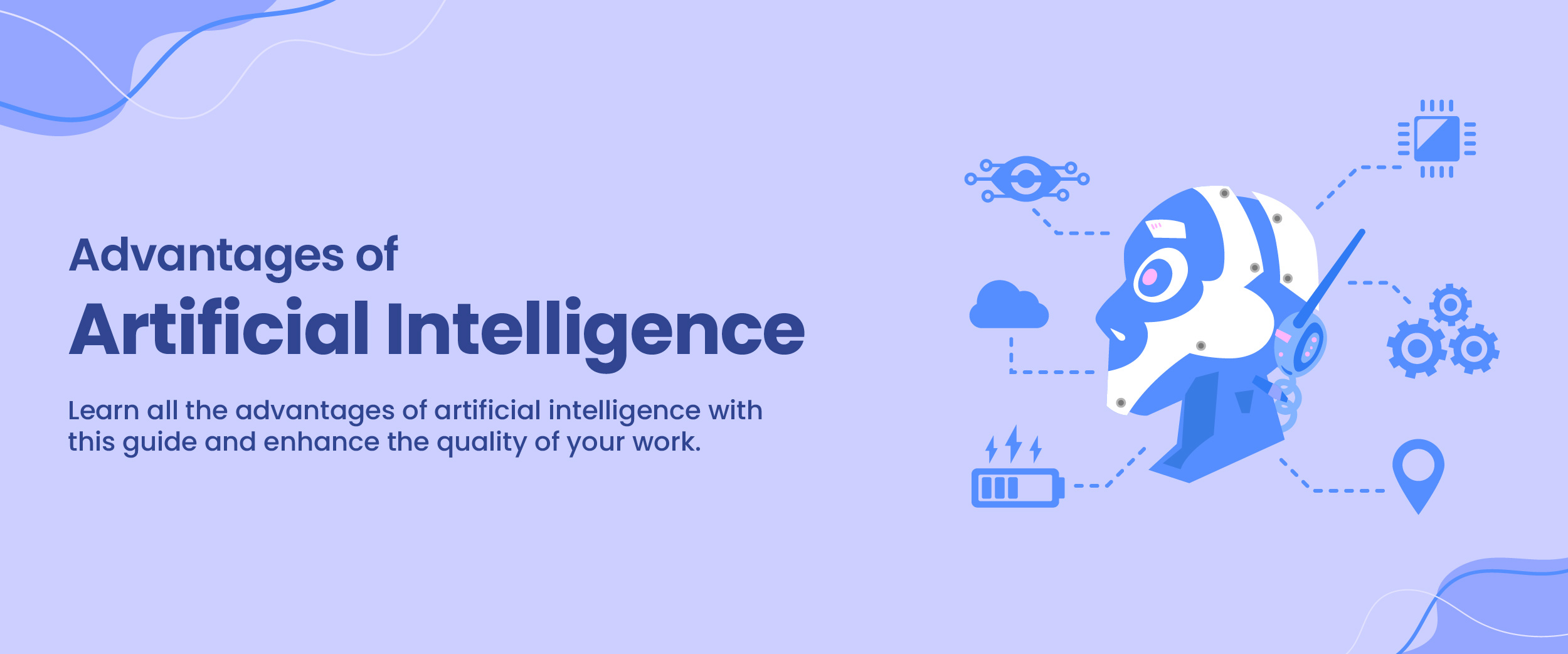8 Advantages and Disadvantages of Artificial Intelligence (AI)
Artificial intelligence (AI) is a rapidly developing discipline that includes the construction of intelligent computers that can do activities customarily requiring human intellect, such as visual perception, vocal recognition, decision-making, and language translation. Today, AI is implemented in almost every area of life, from self-driving vehicles to voice assistants like Siri and Alexa. In this blog, we will examine the advantages and disadvantages of artificial intelligence (AI) to learn how it might aid individuals and try to comprehend its potential drawbacks.
8 Advantages of Artificial Intelligence (AI)
Some of the Benefits of Artificial Intelligence include:
1. Speed and Efficiency
AI systems can assimilate large volumes of data at superhuman rates, facilitating rapid and accurate decision-making. Here are some of the areas where AI demonstrates its quickness and efficacy:
- AI-Powered Self-driving Automobiles: Self-driving vehicles utilize AI to interpret data from sensors, cameras, and other sources to execute sophisticated driving movements and prevent accidents. This is crucial for guaranteeing the safety of passengers and other road users.
- AI Assistants: Siri and Alexa can also promptly comprehend voice requests and react with the correct information or conduct duties for the user. This is conceivable because AI systems can analyze human language and perceive its meaning.
Also Read: Types of Machine Learning
2. Accuracy and Precision
Accuracy and precision are significant advantages of AI that can enhance performance and result in numerous domains. AI technology, like machine learning, can recognize intricate patterns and make very accurate predictions based on that data. Some examples of such features include:
- Business Sector: By analyzing past data and different information from different dealers, AI can easily generate accurate forecasts for the next 6 months for an FMCG company.
- Healthcare: AI is swiftly being utilized in healthcare to diagnose disorders, identify certain types of malignancies, and accurately forecast patients’ prognoses. This can lead to earlier diagnosis and more effective therapies, enhancing patient outcomes. This can lead to earlier diagnosis and more effective therapies, enhancing patient outcomes.
3. Continuous Availability and Consistent Performance
Another one of the essential advantages of Artificial Intelligence (AI) is its availability and consistent performance. AI systems can function continuously without breaks, which makes them ideal for activities that need ongoing monitoring or analysis. This is beneficial, especially in industries like:
- Banking and Cybersecurity: AI can identify and react to potential threats without human interaction. AI systems can function perpetually at high levels without fluctuation or degeneration.
- Automated Customer Service: AI provides prompt and consistent replies to client queries, enhancing customer satisfaction and decreasing the burden for human customer care employees.
If you wish to learn more about the use of machine learning in AI, you can pursue a machine learning course.
4. Cost and Time Efficient
AI can automate complicated or commonplace operations and procedures that would otherwise take hours of human labor. This enables employees to concentrate on more creative or strategic duties, enhancing productivity and efficiency. Some examples are:
- Self-Service AI Terminals and Checkouts: These are becoming more omnipresent in retail establishments and restaurants, enabling consumers to place orders and make payments without the need for human cashiers. This saves companies money on labor expenses and can enhance efficiency by cutting wait time for consumers.
- Automatic Demand Analysis: AI can help organizations to generate demand analysis and patterns with the help of accurate data analysis and processing. The more accurate the demand is, the more accurate the material planning would be. This helps companies to save significant time and cost.


5. New Discoveries and Knowledge
AI excels in discovering patterns and insights in vast volumes of data that humans could not readily identify. This is especially beneficial in domains such as:
- Astronomy: AI can analyze large volumes of data to discover new celestial objects and occurrences.
- Medical Industry: AI can be used to analyze medical data and discern patterns that can influence novel therapies and interventions, leading to new discoveries and improved health outcomes.
6. Improved Decision-Making
AI provides insights and forecasts that can influence wiser decision-making by evaluating enormous volumes of data from numerous sources. By combining data from diverse sources, AI can give a full picture of a situation, enabling decision-makers to make more informed and accurate judgments. This is especially valuable in industries such as agriculture.
In the agricultural industry, AI can be used in crop monitoring, pest detection, and yield prediction. By analyzing weather conditions and past data, farmers can make informed decisions to generate maximum output.
7. Enhanced Personalization
Another one of the major benefits of AI is its capacity to boost personalization. AI can customize experiences based on individual interests and behaviours by evaluating data from numerous sources. Some examples include:
- E-Commerce Sites: They can utilize AI to deliver customized suggestions based on a customer’s prior purchases and browsing behaviour. This can lead to a better client experience and more revenue for the firm.
- Personalized Healthcare: AI can potentially be used to give personalized healthcare advice based on an individual’s medical history and genetic makeup. By analyzing vast amounts of medical data, AI can identify patterns and insights that can lead to customized treatment plans and therapies. This will produce more effective medications and better health outcomes for patients.
8. Increased Safety and Security
The application of AI in safety and security is another major advantage. AI can be used to monitor and discover probable security risks by analyzing vast amounts of data from multiple sources. This can assist in:
- Preventing Security Breaches: AI might possibly boost public safety by reviewing data from multiple sources to discover likely crime hotspots. This can aid law enforcement agencies in deploying resources more effectively to prevent terrorist attacks or other security breaches.
- Remove Infrastructural Flaws: AI can be used to monitor essential infrastructure, such as power plants and transportation networks, to discover and avert probable flaws before they can cause harm. This is particularly crucial for implementing public safety.
Also Read: Artificial Intelligence and Machine Learning
3 Disadvantages of Artificial Intelligence (AI)
There are certain drawbacks to the widespread use of artificial intelligence. Some of the drawbacks of artificial intelligence are:
1. Job Displacement
One of the anticipated consequences of AI is job displacement. The automation of particular jobs and processes via the deployment of AI systems can lead to the displacement of workers in specific locations. As AI systems get more advanced, some job duties can become outdated, leading to widespread unemployment in particular areas. This can be especially problematic for people who do not have the ability to transfer to new job obligations.
It is crucial for firms and governments to evaluate the anticipated influence of AI on the labor market and to take steps to prevent the negative consequences of job displacement. This can entail retraining initiatives for people whose occupations are in danger of becoming automated as well as attempts to help workers affected by job displacement.
2. Reliance on Technology
Another possible downside of AI is over-reliance on technology. While AI systems can bring numerous advantages, depending too much on them might lead to significant concerns if the systems fail or malfunction. This can be especially troublesome in crucial industries such as healthcare or finance, where errors can have catastrophic implications.
Additionally, the absence of human control in certain AI systems might lead to unforeseen outcomes. This is because AI systems are only as good as the data they are trained on, and if that data is biased or inadequate, it might lead to inaccurate choices or actions. It is crucial to establish a balance between the advantages and disadvantages of AI while maintaining some human monitoring to guarantee that it is utilized responsibly and ethically.
3. Ethical Concerns
AI can be used for immoral objectives, such as the generation of deep fakes, which are modified films or pictures that can be used to propagate false information or malign persons. Additionally, the development of autonomous weapons powered by AI raises worries about the potential for these weapons to make judgments that might lead to injury or loss of life.
Another ethical worry is that bias might be incorporated into AI systems owing to the data used to train them. If the data used to train an AI system is biased, the resultant system can likewise be prejudiced, leading to conclusions or actions that discriminate against particular groups. This is especially troublesome in industries such as employment or financing, where biased AI systems might perpetuate prejudice and inequality.
4. Leads to a Sedentary Lifestyle
The ever-advancing technology of AI is causing humans to grow increasingly lazy with regard to the effort they put into their work. This has created an environment where people rely almost exclusively on machines and robots, something that could prove disastrous in the years ahead if it continues unchecked. It could potentially lead to health problems for future generations.
5. Lack of Empathy
Although AI systems excel at processing vast amounts of data, they lack the human ability to understand, resonate, and respond to emotions. This can become a challenge in certain sectors, such as healthcare and education, leading to misinterpretations and inappropriate responses.
Advantages and Disadvantages of AI in Different Sectors and Industries
AI plays various roles in different sectors of our modern society, bringing both advantages and disadvantages. Following are some of these advantages and disadvantages.
| AI in Different Sectors | Advantages of AI | Disadvantages of AI |
|---|---|---|
| AI in Marketing | Analysis of customer data through AI can lead to more targeted and personalized marketing messages. This results in higher conversion rates for customers who are satisfied with the product or service offered by businesses. As a consequence of using AI-driven campaigns that maximize resources efficiently, marketers also stand to gain increased returns on investment. | AI models for marketing purposes can sometimes lead to biasness. Furthermore, there are also system vulnerabilities that companies must be aware of. If adversaries were successful in infiltrating a company’s AI infrastructure, this could leave their sensitive financial data open to attack. |
| AI in Healthcare | AI algorithms can analyze vast medical data, leading to more accurate and timely diagnosis and treatment. AI can identify patterns and anomalies that might be challenging for human clinicians to detect, enabling earlier disease detection. By assisting healthcare professionals, AI can improve treatment outcomes for patients. | AI systems rely on sensitive patient data, requiring strict measures to ensure privacy and prevent unauthorized access. AI algorithms may reflect biases present in the data, potentially leading to unfair treatment recommendations for certain patient groups. Al may lack the emotional empathy and understanding that human healthcare providers can offer. |
| AI in Education | AI can provide tailored educational content and adaptive learning paths for students, allowing them to learn at their own pace and engage with relevant material. | Collecting and analyzing student data could lead to concerns about the security of their information. An overreliance on data might disregard other important aspects of education, such as holistic learning or individual creativity development. Utilizing too much artificial intelligence in schooling may reduce the role human educators have in teaching students. |
| AI in Transportation | AI has the potential to enhance safety and efficiency in transportation by providing advanced driver assistance systems (ADAS) and autonomous vehicles, which can help reduce human error or accidents. Additionally, utilizing data from sensors, cameras, and other sources allows for quick decisions that would improve traffic flow. Also, it helps with route planning and predictive maintenance of vehicles, reducing congestion due to unplanned stops or irregularities on routes taken frequently. | AI in transportation presents ethical and legal challenges, such as determining who is responsible for accidents involving autonomous vehicles. Additionally, decisions related to traffic management or accident avoidance may involve complex ethical considerations. |
| AI in Creativity | AI technologies can help artists, writers, and musicians with the genaration of ideas. It can bring new artistic styles to help people with the creative process. | AI cannot be as creative as a human. This is because it lacks emotional connection, depth, and unique perspectives that most humans get through experiences. |
Conclusion
AI has great potential to revolutionize our lives and society in many ways. Its benefits like speed, accuracy, and 24/7 availability, among others, are apparent, However, it is crucial to recognize the potential advantages and disadvantages of artificial intelligence, including employment displacement, dependency on technology, and ethical problems. With proper development and application, AI can be a great instrument for creativity, advancement, and prosperity.
FAQs
Artificial intelligence can increase efficiency and productivity by automating complex tasks in different industries. It can also help reduce the cost of production and operation while eliminating human error. AI-based technologies are able to quickly analyze large amounts of data with accuracy and provide more accurate predictions than humans.
Organizations that can successfully leverage AI solutions to improve efficiency, productivity, and cost-effectiveness will benefit the most from AI.
AI in healthcare can help improve the accuracy and speed of diagnosis, making patient care more efficient. It can also enable personalized treatments tailored to the individual needs of patients, helping reduce overall healthcare costs. In addition to this, using chatbots or voice assistants can help bridge communication gaps between doctors/nurses and patients with no physical presence required from either party.
AI has revolutionized the entertainment industry by making content production faster, more cost-effective, and easier to tailor for different types of audiences.
AI is being used in daily life for tasks, such as natural language processing, facial recognition, and providing automated customer service.
A major disadvantage of AI to the environment is that it can require excessive amounts of energy and other resources to operate.
AI can be time-consuming and difficult to understand, making it a challenge for students to gain the full benefit of its use.
The main problems with AI in education include a lack of trust, privacy issues, and inadequate data protection. AI in education can lead to diminished student autonomy and hindered diversity of learning styles.
The disadvantages of artificial intelligence in agriculture include increased costs, potential job loss due to automation, and reliance on machines that can limit farmers’ capability for effective decision-making.







